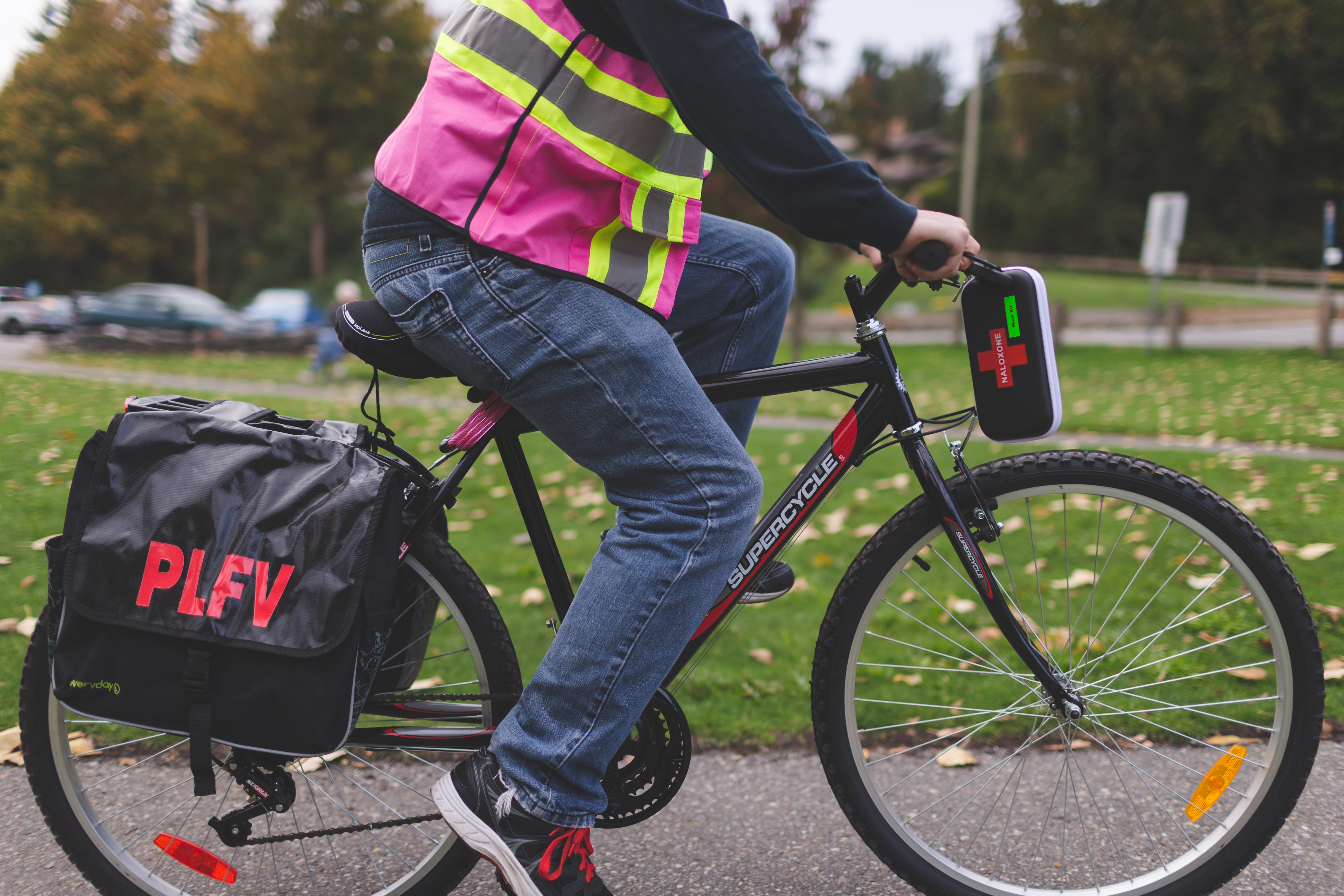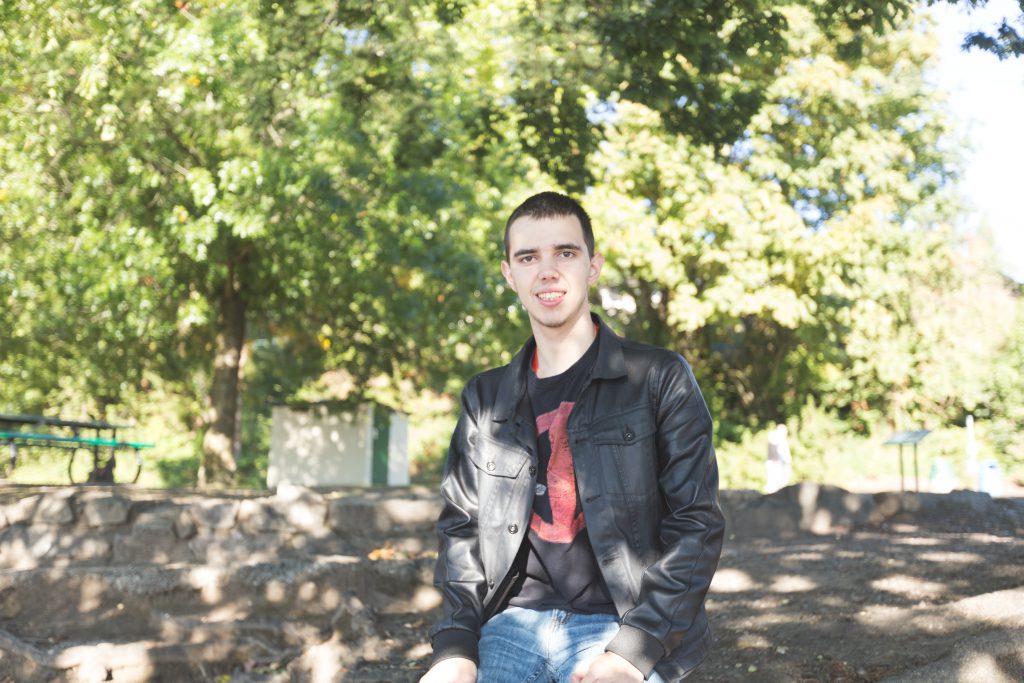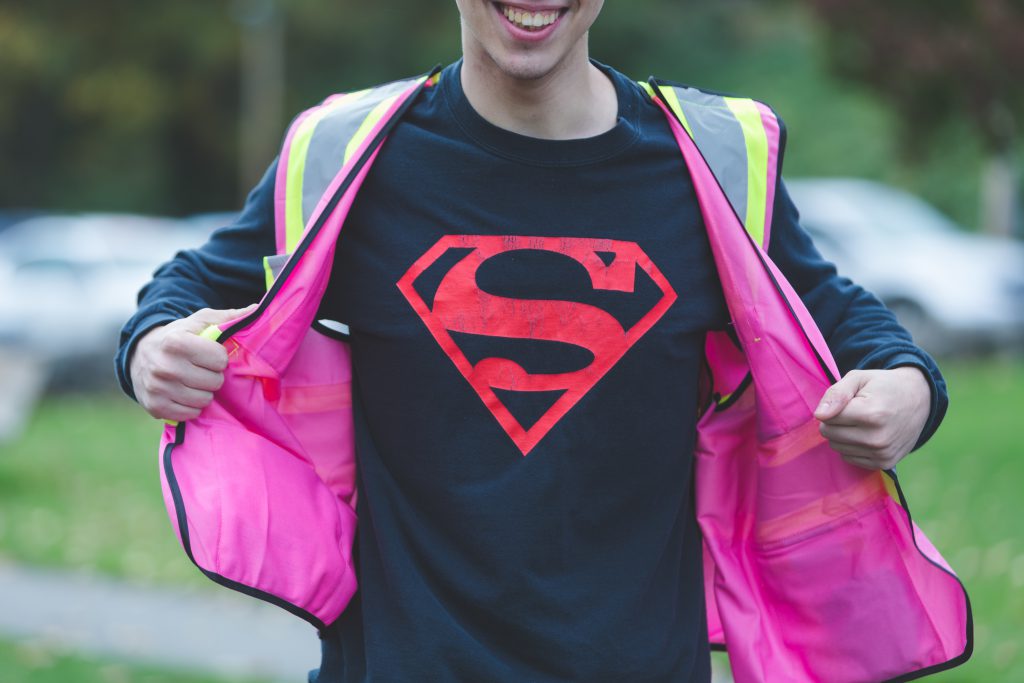Julian’s Story
IT’S SUNDAY AFTERNOON, and an incessant drizzle falls on Abbotsford’s Mill Lake Park. It’s dark and cold, and the wind is howling like a wolf. Even the dogs who drag their reluctant owners across the boardwalk are bundled up in their heavy jackets and scarves.
It is – for all intents and purposes – a perfect day to be watching Netflix and drinking hot chocolate in bed.
But Julian isn’t binge-watching shows nor snuggling in his pajamas. Instead, even though it’s rainy and windy and this is the only day off he’s had all week, Julian is riding a bike around the park.
He’s not riding for fun nor for the exercise. No. Julian is here on a mission. That’s why he’s wearing a hot pink reflective vest that makes him stand out against the drab background of browns and greys. The vest identifies him as a member of the Pinkies, a group of self-organized twenty-somethings who are joining the fight against one of the worst public health crises British Columbia has ever seen.
“Earlier this year a group of eight of us decided we wanted to help out,” says the 21-year-old. “So we bike around Abbotsford handing out clean needles and other safe-use supplies and giving out snacks to homeless and drug-addicted youth. We also carry our Naloxone kits with us, and are trained to help save lives if we need to.”
“When I was first trying to find other people who went through something like I had, I literally googled ‘am I alone?’ and went from there.”
There’s a clear need for this kind of work. According to the BC Coroner’s Service, a record-breaking 1,449 people died of overdoses in the province in 2017—which is exactly what Julian and the Pinkies are trying to prevent.
“As much as we don’t want anybody to be doing drugs, we know that we can’t stop them, so we may as well try to make sure that they aren’t overdosing or getting infected by the supplies they’re using,” he says. “It’s something small, but it helps, because we’re doing something that other people simply won’t.”
On this particular Sunday, a young man walks up to a covered picnic table a few metres up from the water. He can’t be older than 16. He plops onto the table, and pulls some drug paraphernalia out of his backpack.
Julian walks up to him and introduces himself. There’s no fear or judgment in his voice. Instead, he calmly tells the young man about the Pinkies, and asks if he’s seen any used needles around that need to be safely disposed of. He also asks whether the young man has safe use supplies himself.
The guy nods, and Julian shakes his hand. “If you need any help, just let me know,” he says.
“Will do,” replies the young man, and sends Julian off with a big smile and a thank you.

JULIAN HAS ALWAYS LOVED SUPERMAN. He has vivid memories of being five years old, and fantasizing about having superpowers. In those fantasies he always used his superpowers to help others—no matter who they were.
“If I was to think of a perfect real life hero and the things that he or she has, I can relate a lot of those aspects to Superman,” he says. “Especially the non-judgmental part of it. Superman helped everyone, regardless of whether they were good or bad.”
That blind selflessness was not the only thing that Julian admired about the Man of Steel. Perhaps because he grew up in a house where pain was a daily reality, he always hoped he could be bulletproof like his idol. That way, he thought, nothing could ever hurt him. But that dream came tumbling down when Julian was 15, and a traumatic experience showed him that he wasn’t as indestructible as he hoped.
“In 2011, I was sexually abused by a close family friend,” he says. “At first I had no idea how to deal with it: I missed school for six to eight months because I didn’t know how to cope with it.”
“I don’t really know what changed, but at one point I just told myself that I didn’t want to be a victim anymore—I wanted to be a victor.”
In the months that followed the attack, Julian receded into his own world. He’d spend days on end in his room, not wanting to talk to anyone. The pain festered inside of him, until one day he decided he was done with it.
“I don’t really know what changed, but at one point I just told myself that I didn’t want to be a victim anymore—I wanted to be a victor.”
Re-energized, Julian went back to school and worked hard to catch up with his classmates. He completed an entire school year in three months, achieving a B average in the process. Although the trauma he’d experienced was far from gone, Julian had managed to put himself on a path to healing, and to march down that path he’d once again draw inspiration from his favorite superhero.
“At that point I thought to myself, I know I’m not bulletproof and I don’t think I have superpowers – but I can still help others. If I did that, I’d at least be one third of the way there.”

IN ORDER TO FULFILL HIS MISSION OF HELPING OTHERS, Julian first had to find a community of people that would support him in his long road to recovery. Although he hadn’t been very social growing up, something inside of him told him that healing required connecting with other young people who had experienced a similar kind of trauma.
“When I was first trying to find other people who went through something like I had, I literally googled ‘am I alone?’ and went from there,” he remembers.
Although that first search was broad, it wasn’t long before Julian was connecting with other young people on online forums, and using the Youth in BC chat and phone service to get support and information about overcoming abuse. When he was comfortable enough, he sought out a youth group in Abbotsford, and began opening up to others and sharing his story.
“A lot of people think that sharing your story and being vulnerable is a sign of weakness, but I think it’s the opposite—vulnerability is a sign of strength. Every time life hits you and you get knocked down, sharing that vulnerability with others makes you stand up and become stronger,” he says.
As Julian spoke to people about what happened to him, he began creating a supportive community. Today this community includes youth advisors, family members, and friends, some of whom he now considers his brothers and sisters.
“I don’t know where I would be without them. Honestly, when life goes downhill, or I’m starting to feel down, I know I can always talk to them, and that gives me strength,” he says. “And I know the same goes for them: whenever they need me, they know I’m here for them.”
“A lot of people think that sharing your story and being vulnerable is a sign of weakness, but I think it’s the opposite—vulnerability is a sign of strength. Every time life hits you and you get knocked down, sharing that vulnerability with others makes you stand up and become stronger.”
AS WE WALK THROUGH MILL LAKE PARK IN THE RAIN, Julian tells me that him and his friends decided to create the Pinkies in the summer of 2017.
To do so they partnered with Positive Living Fraser Valley, an NGO that was already handing out safe-use supplies to Abbotsford’s homeless population but using a van instead of bikes. The Pinkies thought they could access more young people if they biked, and the people at Positive Living agreed: they helped Julian and his friends access safe-use supplies, and provided them with Naloxone training to help prevent overdoses.
Four months in, the project is receiving support from the city, the local health authority, and the police, and talks are underway to replicate it around the province.
“I decided to help this population because when I was first starting to get better, I hung out at a youth centre and met a lot of young people who were living on the streets and got to experience their homelessness first hand,” he remembers. “Even back then I wanted to help, but I felt like there was nothing I could do. But now that my life is more stable and things are going so well, I knew it was my time to help – and here I am just a few years later: on a bike wearing a pink vest and going around town helping people.”
We’re walking and talking and when we finally get to the water, Julian tells me that his goal is to become a lawyer, so that he can advocate for this population on a more systemic level.
As he says this, something strange happens. A gust of wind rips Julian’s vest open, and as the hot pink fabric flutters in the wind, we can’t help but laugh when we see what’s revealed beneath. Connor, our photographer, captures a picture of it: printed across the front of Julian’s blue, long sleeve shirt, is a familiar symbol—Superman’s S-shaped shield.
“I told you he’s my inspiration,” Julian says, and he really means it.

This story is part of a series aimed at sharing the experiences of young people across BC. As part of Foundry’s goal to work alongside young people, create connections and promote mental health and wellness, we are creating a platform for young people’s stories to be heard.
Article by Peter Mothe. Photography by Connor McCracken.
If you are in crisis, please call 1-800-784-2433.
Find out more about Foundry.